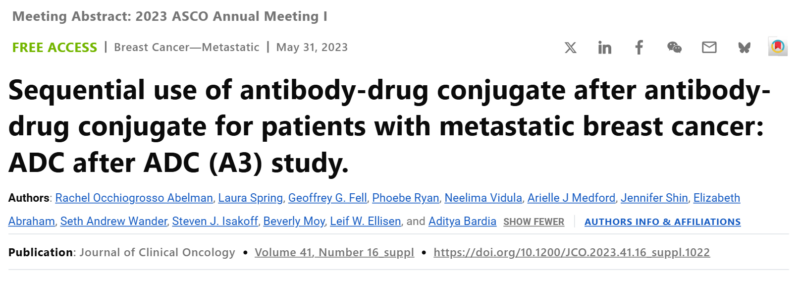
Ming-Hei Tai: How should we interpret the new TROPION-Breast01 data
Ming-Hei Tai, Clinical Pharmacy Specialist at Karmanos Cancer Institute, shared a post on LinkedIn about a paper by Rachel Occhiogrosso Abelman et al. published in the Journal of Clinical Oncology:
“How should we interpret the new TROPION-Breast01 data? This trial compared datopotamab deruxtecan (Dato-DXd), an antibody-drug conjugate (ADC), to physician’s choice chemotherapy in unresectable or metastatic, HR-positive, HER2-negative breast cancer.
It originally read out with a progression-free survival benefit with a hazard ratio (HR) of 0.63, which led to its FDA approval. However, its overall survival (OS) subsequently read out at a HR of 1.01.
Why was this? 289 patients on the physician’s choice arm received subsequent therapy. 88 of them received a different ADC. 269 on Dato-DXd received subsequent therapy, and 45 received a different ADC. This imbalance was enough to cause the OS curves to cross. When the study adjusted the OS data for antibody-drug conjugate use, the HR was 0.86.
After some reflection, here are my thoughts. The adjusted analysis shows that Dato-DXd could be effective if we do not consider other ADCs. However, a small imbalance in ADC use caused the OS curves to cross. This imbalance was not by mistake.
There is evidence that ADC cross-resistance is a real phenomenon (https://lnkd.in/eikRti_T). This was an open-label trial so investigators knew who received Dato-DXd. The imbalance in ADC use was likely driven by investigator wariness of cross-resistance.
The overall survival data needs to be published so we can better understand whether there was actual cross-resistance in the Dato-DXd arm.
So, given that use of Dato-DXd would likely suppress the use of other established ADCs, Dato-DXd should only be reserved for patients ineligible for other ADCs. Also, considering the data on subsequent ADC use in TROPION-Breast01, it is likely that Dato-DXd is an inferior ADC.
This might be an unfair assumption, as the trial was not designed to test this question, but the advantage always goes to agents with established clinical profiles. It is on Dato-DXd to prove equivalency or superiority. As of right now, Dato-DXd is the third choice ADC in breast cancer.”
Authors: Rachel Occhiogrosso Abelman, Laura Spring, Geoffrey Fell, Phoebe Ryan, Neelima Vidula, Arielle Medford, Jennifer Shin, Elizabeth Abraham, Seth Andrew Wander, Steven Isakoff, Beverly Moy, Leif Ellisen, and Aditya Bardia.

-
Challenging the Status Quo in Colorectal Cancer 2024
December 6-8, 2024
-
ESMO 2024 Congress
September 13-17, 2024
-
ASCO Annual Meeting
May 30 - June 4, 2024
-
Yvonne Award 2024
May 31, 2024
-
OncoThon 2024, Online
Feb. 15, 2024
-
Global Summit on War & Cancer 2023, Online
Dec. 14-16, 2023
